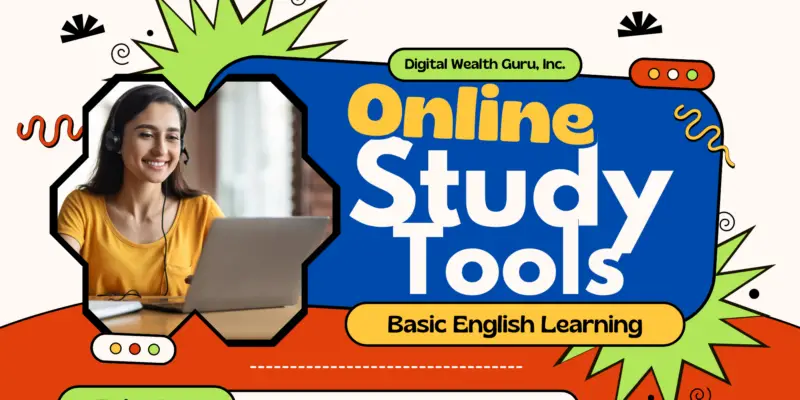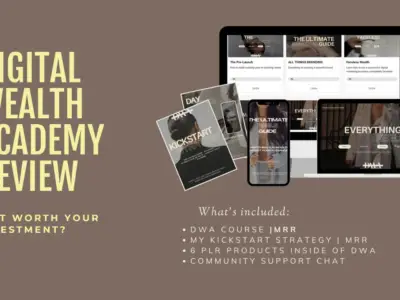Discover the best online study tools to boost your productivity, organization, and focus. From note-taking apps to flashcards, AI tutors, and more, these tools will revolutionize the way you study.
The digital age has transformed how we learn, opening up a wealth of online study tools designed to make our academic journeys smoother and more efficient. Whether you’re a high school student, a college undergrad, or a lifelong learner, these tools can supercharge your studies, help you retain information better, and achieve your educational goals.
In this comprehensive guide, we’ll delve into the best online study tools available in 2024, spanning categories like:
- Note-taking and Organization
- Flashcards and Memorization
- Research and Citation
- AI-Powered Learning
- Focus and Productivity
What is Online Study?

Online study, also known as distance learning or e-learning, refers to any educational instruction and learning that takes place over the Internet. Instead of traditional classroom settings, students access course materials, lectures, assignments, and exams through digital platforms.
This format offers flexibility and accessibility, allowing learners to engage with educational content at their own pace and from anywhere with an internet connection.
Types of Online Study
- Synchronous Learning: This involves real-time interaction between students and instructors through video conferencing, live chats, or virtual classrooms. It mimics the immediacy of a traditional classroom.
- Asynchronous Learning: In this format, students access pre-recorded lectures, readings, and assignments at their convenience. They can complete coursework and participate in discussions on their schedule.
- Hybrid Learning: This combines elements of both synchronous and asynchronous learning. Some classes might be held online, while others require in-person attendance.
- Massive Open Online Courses (MOOCs): These are large-scale online courses open to anyone, often offered by universities and educational institutions. They provide a flexible way to learn various subjects.
Benefits of Online Study
- Flexibility: Study whenever and wherever you want, fitting education around your existing commitments.
- Accessibility: Reach educational resources regardless of your geographic location.
- Variety of Courses: Choose from a wide range of subjects and specializations, often not available locally.
- Affordability: Online courses can be more cost-effective than traditional programs, as they often have lower tuition fees and eliminate commuting costs.
- Personalized Learning: Many online platforms offer personalized learning paths tailored to individual needs and learning styles.
Challenges of Online Study

- Self-Discipline: Requires strong time management and self-motivation skills.
- Technology Requirements: Reliable internet access and a computer or mobile device are essential.
- Limited Social Interaction: Can feel isolating compared to in-person learning environments.
- Technical Issues: Occasional connectivity problems or platform glitches can disrupt learning.
Who is Online Study For?
Online study is suitable for a wide range of learners, including:
- Working Professionals: Upskill or pursue further education without disrupting their careers.
- Stay-at-Home Parents: Balance childcare responsibilities with educational pursuits.
- Students in Remote Areas: Access quality education that might not be available locally.
- Lifelong Learners: Explore new interests and acquire knowledge at any stage of life.
Study Tools Online
In the world of online study, having the right study tools online can be the difference between struggling and thriving. These digital resources enhance your learning experience, streamline your study process, and cater to various learning styles. Here’s a breakdown of the best study tools:
Note-Taking and Organization
- Notion: This all-in-one workspace combines note-taking, project management, and even wiki capabilities. It’s incredibly versatile for organizing complex information.
- Evernote: A classic for a reason, Evernote offers robust note-taking with features like web clipping, audio recording, and tagging for easy searching.
- Obsidian: If you’re into interconnected notes and building a personal knowledge base, Obsidian’s visual linking and graph view are a game-changer.
- OneNote: Part of the Microsoft suite, OneNote is a reliable option for handwritten notes, digital ink, and collaborative projects.
Flashcards and Memorization
- Anki: The gold standard for spaced repetition flashcards, Anki is highly customizable and adapts to your learning pace for efficient memorization.
- Quizlet: A user-friendly platform with millions of pre-made flashcards, Quizlet also offers games and learning modes to make studying fun.
- Brainscape: Combining cognitive science with flashcards, Brainscape optimizes your study sessions for maximum retention.
Research and Citation
- Zotero: A powerful research tool for collecting, organizing, and citing sources. It integrates seamlessly with your web browser and word processor.
- Mendeley: Similar to Zotero, Mendeley offers robust citation management and a platform for discovering research papers and collaborating with others.
- Paperpile: If simplicity is your priority, Paperpile offers a clean interface for managing references and generating citations.
AI-Powered Learning
- Grammarly: An indispensable writing assistant that catches grammar errors, suggests style improvements and even checks for plagiarism.
- Quillbot: Take your writing to the next level with Quillbot’s paraphrasing and summarization tools. It’s great for refining essays and reports.
- Khan Academy: Offering thousands of free educational videos and interactive exercises, Khan Academy covers a wide range of subjects from math to art history.
Focus and Productivity
- Forest: Stay focused and avoid distractions with Forest, an app that grows a virtual tree while you work. If you leave the app, your tree dies!
- Freedom: Block distracting websites and apps during study sessions to maximize your concentration.
- Focus@Will: This music streaming service offers scientifically optimized soundtracks designed to enhance your focus and productivity.
How AI is Revolutionizing Online Study

Artificial intelligence (AI) is rapidly changing the landscape of online education, offering new tools and possibilities for both learners and educators. Here’s how AI is revolutionizing the online study experience:
- Personalized Learning:
- AI-powered platforms analyze individual learning patterns, preferences, and strengths to create tailored learning paths.
- Adaptive learning systems adjust the difficulty and content of materials in real-time, ensuring optimal engagement and progress.
- AI tutors can provide personalized feedback, answer questions, and guide students through challenging concepts.
- Intelligent Tutoring Systems (ITS):
- AI-driven ITS simulates one-on-one tutoring, offering personalized instruction, feedback, and practice exercises.
- They adapt to each student’s pace and learning style, maximizing comprehension and retention.
- ITS can be particularly helpful in subjects like math and language learning, where individual attention is beneficial.
- Automated Grading and Feedback:
- AI algorithms can quickly and accurately assess assignments, quizzes, and exams, freeing up instructors’ time for more meaningful interactions with students.
- AI-powered feedback systems can provide detailed analysis of student work, highlighting areas for improvement and suggesting resources for further learning.
- Smart Content Creation:
- AI can generate diverse learning materials like quizzes, summaries, flashcards, and practice problems, saving instructors time and effort.
- AI-powered content creation tools can even personalize content for different learners, adapting the language and examples to individual needs and preferences.
- Natural Language Processing (NLP) in Language Learning:
- NLP-powered tools can facilitate language learning by offering real-time translations, pronunciation feedback, and conversational practice with AI chatbots.
- These tools can also analyze student writing and speech to provide personalized feedback and grammar correction.
- Virtual Reality (VR) and Augmented Reality (AR):
- AI-powered VR and AR technologies can create immersive learning experiences, allowing students to explore virtual environments, interact with 3D models, and simulate real-world scenarios.
- These technologies can be particularly valuable for subjects like history, science, and engineering, where visualization and experiential learning are key.
Challenges and Considerations
While AI offers tremendous potential for online learning, it’s important to consider potential challenges:
- Data Privacy and Security: The collection and use of student data raise concerns about privacy and ethical considerations.
- Bias and Fairness: AI algorithms can perpetuate existing biases if not carefully designed and monitored.
- The Role of Human Instructors: AI should augment, not replace, the valuable role of human instructors in providing guidance, support, and mentorship.
The Future of AI in Online Study
The integration of AI in online study is still in its early stages, but its potential is vast. As AI technology continues to advance, we can expect even more innovative and personalized learning experiences that empower students to reach their full potential.
Choosing the Right Online Study Tools
With a vast array of online study tools available, selecting the right ones can seem overwhelming. However, by considering your individual needs and preferences, you can create a personalized toolkit that maximizes your learning potential. Here’s a guide to help you choose wisely:
1. Identify Your Learning Style:
- Visual Learners: If you learn best through diagrams, charts, and images, consider tools like MindMeister for mind mapping or Anki for flashcards with images.
- Auditory Learners: If you prefer listening to lectures and discussions, tools like VoiceThread for audio and video comments or podcasts from educational platforms like Coursera might be beneficial.
- Kinesthetic Learners: If you learn by doing, interactive tools like Khan Academy’s practice exercises or coding platforms like Codecademy could be a good fit.
- Read/Write Learners: If you learn best through reading and writing, note-taking apps like Notion or Evernote might be essential.
2. Define Your Goals:
- Memorization: Flashcard apps like Anki or Quizlet are excellent for memorizing facts and vocabulary.
- Research and Writing: Citation management tools like Zotero or Mendeley and writing assistants like Grammarly are invaluable.
- Focus and Productivity: Apps like Forest or Freedom can help you eliminate distractions and stay on track.
- Collaboration: Tools like Google Docs or Miro for collaborative whiteboarding can facilitate group projects.
3. Consider Your Budget:
- Free Tools: Many excellent study tools are available for free, such as Khan Academy, Quizlet, and Zotero.
- Freemium Tools: These offer basic features for free, with premium options for additional functionality.
- Paid Tools: Some tools require a subscription or one-time purchase, but often provide advanced features and enhanced support.
4. Read Reviews and Compare:
- User Reviews: Check out online reviews to see what other students are saying about different tools.
- Comparison Websites: Websites like Capterra or G2 Crowd provide detailed comparisons of different software options.
- Free Trials: Take advantage of free trials to test out tools before committing to a purchase.
5. Experiment and Adapt:
- Don’t be afraid to try new things: The best way to find the right tools is to experiment and see what works for you.
- Your needs may change: As you progress in your studies, your needs for study tools may evolve. Don’t hesitate to adapt your toolkit accordingly.
By carefully considering these factors, you can build a collection of online study tools that cater to your unique learning style, goals, and budget, ultimately enhancing your academic journey and empowering you to achieve your full potential.
Conclusion: Best Online Study Tools
The right online study tools can make a world of difference in your academic success. Experiment with the tools we’ve covered to find the ones that best suit your learning style and goals. Embrace the power of technology to take your education to new heights!
Discover more from Digital Wealth Guru
Subscribe to get the latest posts sent to your email.









Comments